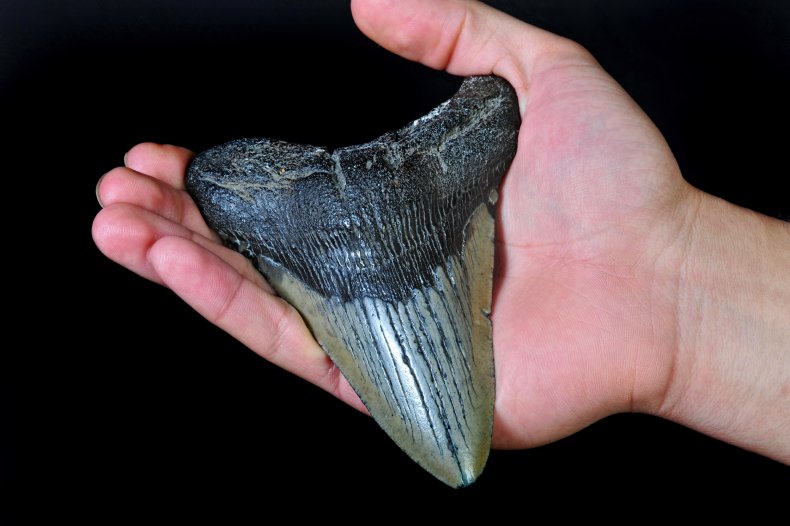BY ROBYN WHITE ON 9/23/22
A megalodon tooth was recently discovered in a phosphate mine, an expert has confirmed to Newsweek.
Reddit user BushyBeaver187, posted a picture of the triangular tooth to the platform, asking other users whether they could help identify it.
"Girlfriend found this at a phosphate mine. After googling, we're trying to figure out if this is a great white or megalodon tooth. Any help is appreciated!" the user wrote in a comment.
Megalodon (Otodus megalodon) was a giant shark species that is thought to have evolved around 20 million years ago. It swam in the world's oceans for the next 13 million years before becoming extinct. The great white shark is a close relative of the megalodon.
The species is one of the largest and most powerful predators to ever have lived. Scientists believe it could have grown up to 50 to 60 feet long.
Most of the known megalodon remains are teeth. These are occasionally found on beaches throughout the world. Because of the similarity in shape, it can be difficult to tell the difference between megalodon and great white shark teeth.
Reddit users took to the thread and speculated about what species the tooth could belong to. Many believe it was from a megalodon, rather than a great white shark.
Ashby Gale, paleontologist and owner of Charleston Fossil Adventures told Newsweek that the tooth "is in fact" from a megalodon. He said the fossil could possibly date back between 3.6 and 15.9 million years.
Shark teeth fossilize quite easily, whereas the rest of the animal is rarely found preserved.
It is not clear how big the megalodon tooth in the Reddit picture is. Some can be very large, with the biggest ever found measuring nearly 7 inches long.
As megalodons lived in seas worldwide, fossilized megalodon teeth can be found in coastal areas all over the world.

A megalodon tooth was recently discovered in a phosphate mine, an expert has confirmed to Newsweek.
Reddit user BushyBeaver187, posted a picture of the triangular tooth to the platform, asking other users whether they could help identify it.
"Girlfriend found this at a phosphate mine. After googling, we're trying to figure out if this is a great white or megalodon tooth. Any help is appreciated!" the user wrote in a comment.
Megalodon (Otodus megalodon) was a giant shark species that is thought to have evolved around 20 million years ago. It swam in the world's oceans for the next 13 million years before becoming extinct. The great white shark is a close relative of the megalodon.
The species is one of the largest and most powerful predators to ever have lived. Scientists believe it could have grown up to 50 to 60 feet long.
Most of the known megalodon remains are teeth. These are occasionally found on beaches throughout the world. Because of the similarity in shape, it can be difficult to tell the difference between megalodon and great white shark teeth.
Reddit users took to the thread and speculated about what species the tooth could belong to. Many believe it was from a megalodon, rather than a great white shark.
Ashby Gale, paleontologist and owner of Charleston Fossil Adventures told Newsweek that the tooth "is in fact" from a megalodon. He said the fossil could possibly date back between 3.6 and 15.9 million years.
Shark teeth fossilize quite easily, whereas the rest of the animal is rarely found preserved.
It is not clear how big the megalodon tooth in the Reddit picture is. Some can be very large, with the biggest ever found measuring nearly 7 inches long.
As megalodons lived in seas worldwide, fossilized megalodon teeth can be found in coastal areas all over the world.

A stock photo shows a megalodon tooth. They can measure up to 7 inches long.
MJ0007/GETTY
In the U.S., common places to come across the teeth are along the southeastern Atlantic coast ranging from Georgia, Florida, the Carolinas and Maryland.
Florida is the area most fossil hunters go to find fossilized teeth. It is believed that Florida used to be a nursery area for megalodon, meaning females would have their young there. Great white sharks still use nurseries today. They are usually in shallow protected areas of water, where the young can learn to fend for themselves.
In August, a fossil hunter found several large megalodon teeth in North Carolina.
The finder, Jonathan Valentine, said in a YouTube video that one tooth measured 6 inches long, while another was 5.5 inches.
In the U.S., common places to come across the teeth are along the southeastern Atlantic coast ranging from Georgia, Florida, the Carolinas and Maryland.
Florida is the area most fossil hunters go to find fossilized teeth. It is believed that Florida used to be a nursery area for megalodon, meaning females would have their young there. Great white sharks still use nurseries today. They are usually in shallow protected areas of water, where the young can learn to fend for themselves.
In August, a fossil hunter found several large megalodon teeth in North Carolina.
The finder, Jonathan Valentine, said in a YouTube video that one tooth measured 6 inches long, while another was 5.5 inches.
No comments:
Post a Comment